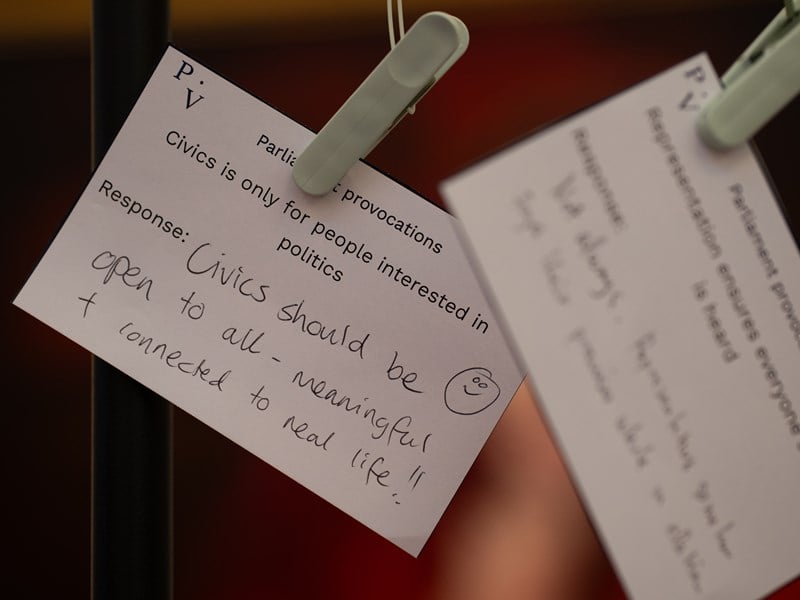Kick starting your CnC classroom
24 August 2025

This blog post covers a number of Teach and Learn resources, professional development and academic readings to help pre-service teachers, and teachers, plan for their civics and citizenship classroom.
Resources
Understanding core concepts
Representation and democracy
This resource explores the different forms of representation, the principles of democracy and how democracy and representation work in Victoria.
Through the activities provided in this teaching guide, students can explore how different models of representation affect decision-making, as well as comparing and contrasting direct and representative systems of democracy. Each of the activities asks students to reflect on the ways that different models of representation and decision-making may affect people’s perspectives on democracy
Explore Representation and democracy teacher guide
Three levels of government
Start a conversation with your students about the three levels of government using this handy set of flashcards.
This set of cards can be used in different ways to explore the concept of three levels of government: federal, state and local. The cards consist of 30 different examples of services and issues that are the responsibilities of the different levels of government.
Explore the Three levels of government flash cards
Exploring a range of perspectives on an issue
Engaging perspectives
Encourage students to engage with and develop a range of perspectives on any given topic using this set of cards.
This set of cards can be used in different ways to explore a range of perspectives on a given topic. The cards consist of three different categories: stakeholders, priorities, and emotional motivations. Each card has a series of questions for students to work through, and the categories when used in conjunction with each other, can encourage students to identify new or different arguments about a given topic.
Explore the Engaging perspectives card deck
Engaging perspectives: Schools
Engage with and develop a range of perspectives on any given topic relating to schools using this set of cards. Great for school and student leaders.
This set of cards can be used to explore issues and topics relating specifically to schools. The cards consist of three different categories: stakeholders, priorities and emotional motivations. Each card has a series of questions to work through, and the categories when used in conjunction with each other, can encourage new or different arguments on a given topic.
Explore the Engaging perspectives: Schools card deck
A guide to challenging conversations
Navigating issues-based discussions in the classroom can be challenging, especially when the issue or topic encourages different perspectives.
This resource provides strategies that are flexible and adaptable, taking into account teaching context, the age of the students, appropriateness of the topic, the depth of discussion, as well as school and community expectations. These strategies also acknowledge perspectives that may be informed by students’ lived experiences, including family or community views and values.
Explore the A guide to challenging conversation teacher guide
Exploring the work of parliament
Engaging with parliament posters
Download and print your own set of classroom posters outlining the ways people can engage with parliament. Designed as simple flowcharts that include the process, key information and QR codes for more information, these can be used to prompt students to get involved and take part in some of Victoria's democratic systems.
Explore the Engaging with parliament digital posters
Debating in chamber
Run a mock debate on any issue or topic using the processes of parliament, with the How to write a bill template and Chamber place cards.
- The How to write a bill template outlines for students some key questions to consider when writing a bill, including who the proposed law applies to, how it will be implemented, and if there are any penalties for not adhering to the law. There are also some prompt questions for students to consider different party positions.
- The Chamber place cards cover some of the key roles for MPs across both of the chambers. Role cards for some parliamentary officers, such as the clerks, Serjeant-at-Arms, Usher of the Black Rod and Hansard reporters, have been included to help differentiate students’ participation in debate.
Explore the resources to support Debating in the chamber
Professional development
The Victorian parliament offers a range of opportunities for teachers looking to engage in professional learning, which are designed to enhance professional knowledge and practice, and support student learning.
There are a range of learning opportunities on offer, including seminars, conferences, workshops and online learning, with particular relevance to Civics and Citizenship and Legal Studies.
Explore the free, self-paced, online professional development Connecting civics and citizenship
Register for our Teach and Learn education e-newsletter, Springboard to find out about other professional development opportunities.
Academic readings
The readings below provide some background to the approach taken when developing the resources on the Teach and Learn page. All of the resources are freely available and cover the importance of working with contemporary issues, democratic discourse and the benefits and limitations to different approaches to civics and citizenship education.
-
Avery, P. G., Levy, S.A., & Simmons, A.M.M. (2013). Deliberating controversial public issues as part of civic education, The Social Studies, 104, 105-114. http://dx.doi.org/10.1080/00377996.2012.691571
-
Biesta, G. J. J. (2011). Learning Democracy in School and Society: Education, Lifelong Learning, and the Politics of Citizenship. Sense Publishers. https://doi.org/10.1007/978-94-6091-512-3
-
Hess, D. (2008). Controversial Issues and Democratic Discourse. In L. S. Levstik & C. A. Tyson (Eds.) Handbook of Research in Social Studies Education (pp. 124–136). Routledge.
-
Laughland-Booy, J. & Ghazarian, Z. (2020). Young people and politics in Australia: An introduction, Journal of Applied Youth Studies, 3 (189-192), https://doi.org/10.1007/s43151-020-00025-1
-
McLaughlin, T.H. (1992). Citizenship, Diversity and Education: A philosophical perspective, Journal of Moral Education, 21(3), 235-250, http://dx.doi.org/10.1080/0305724920210307